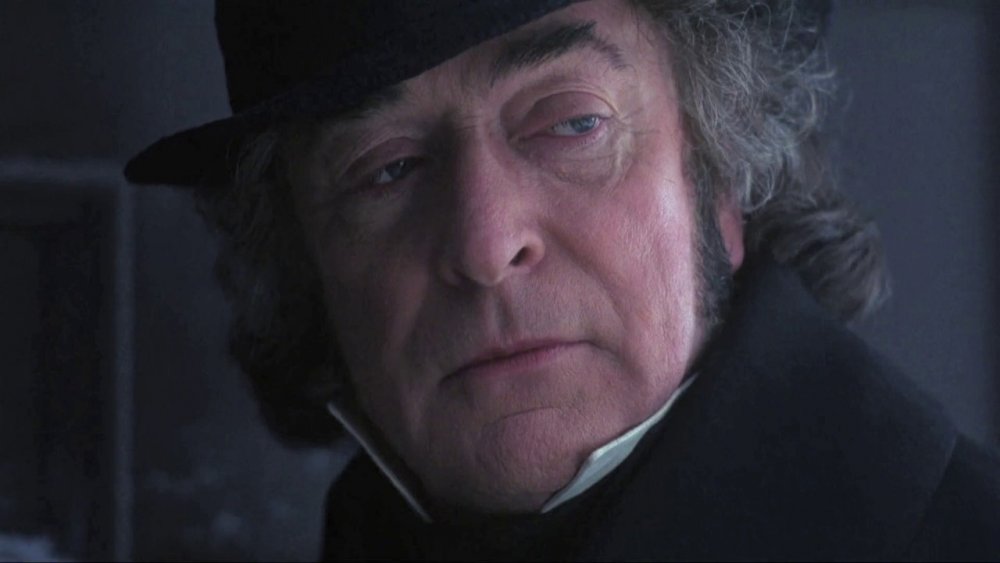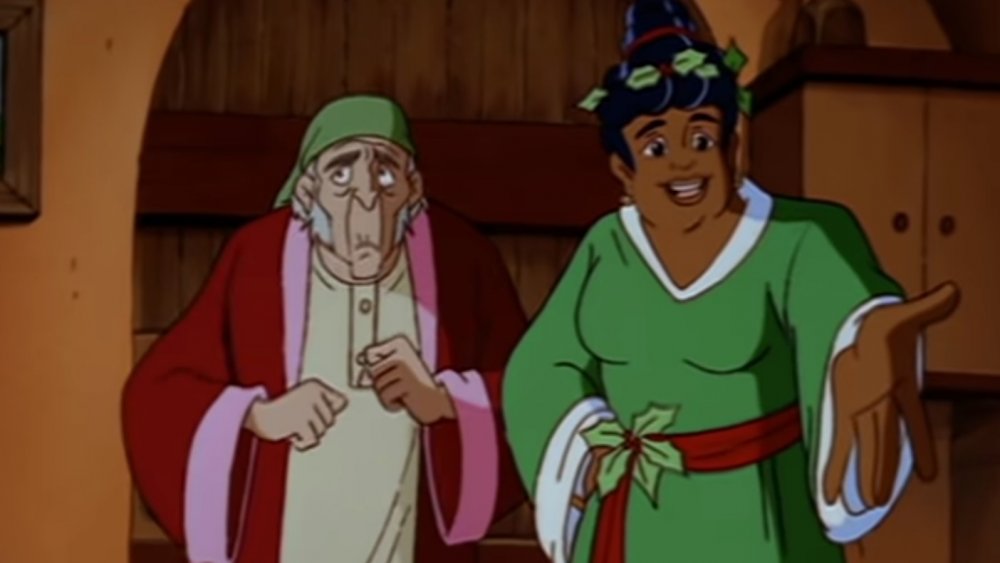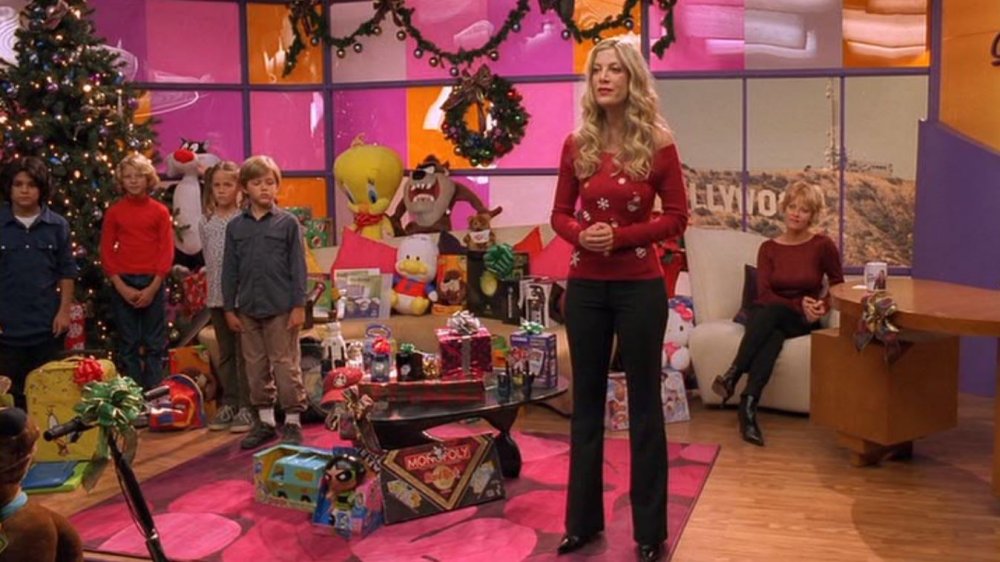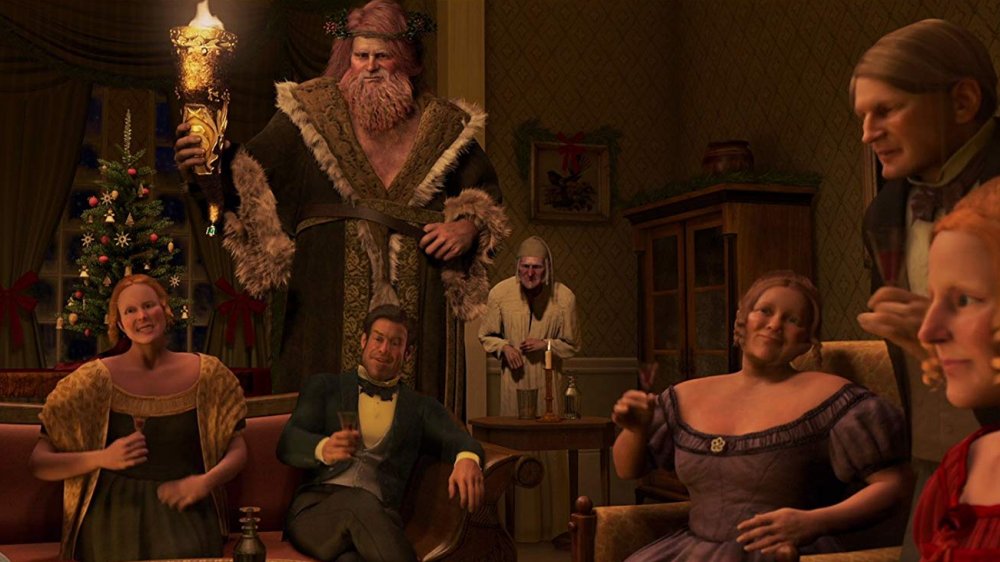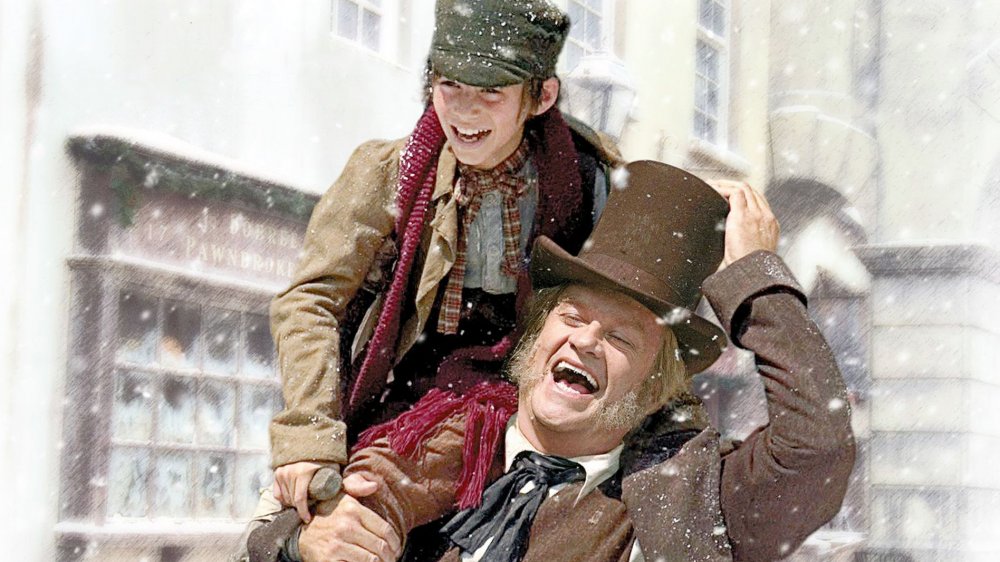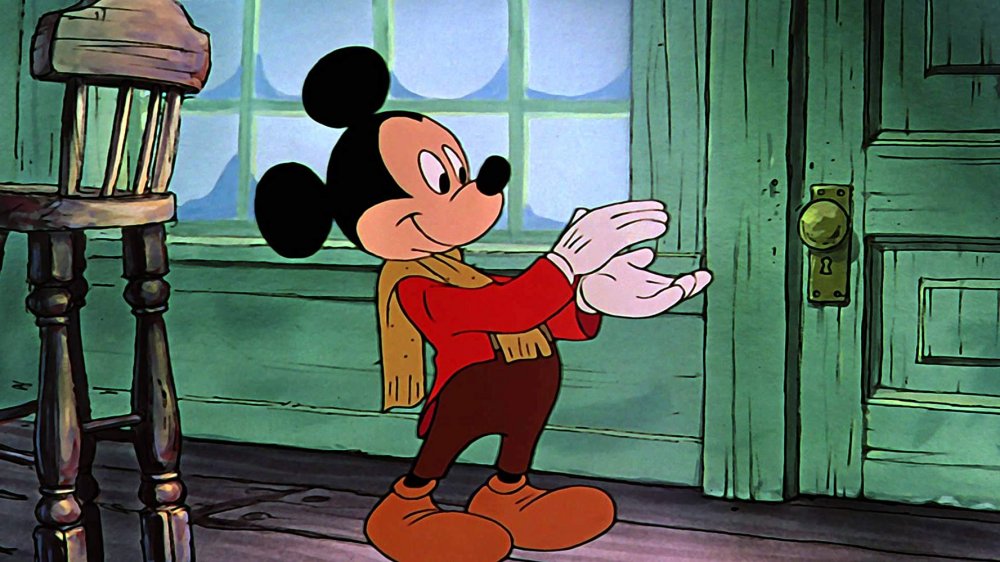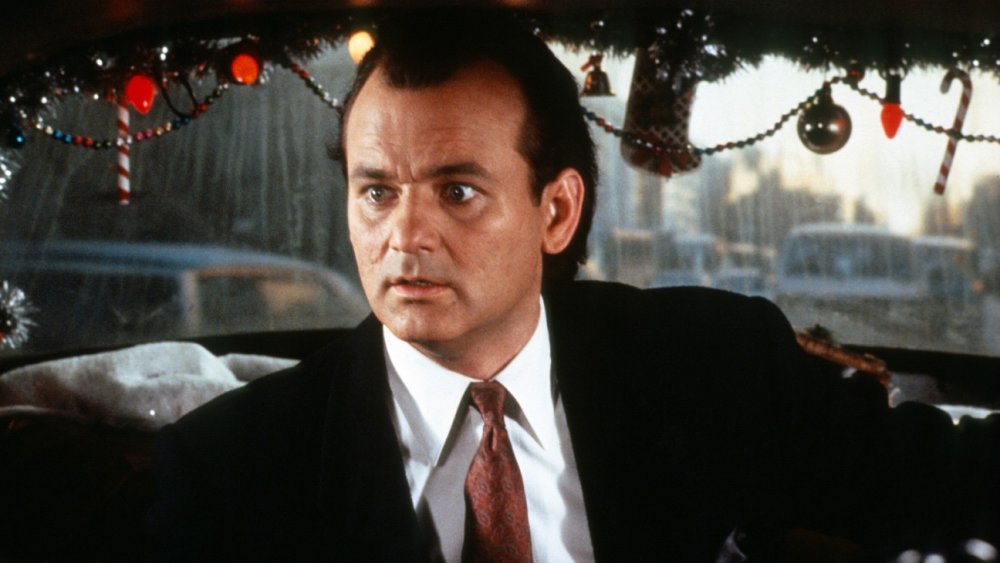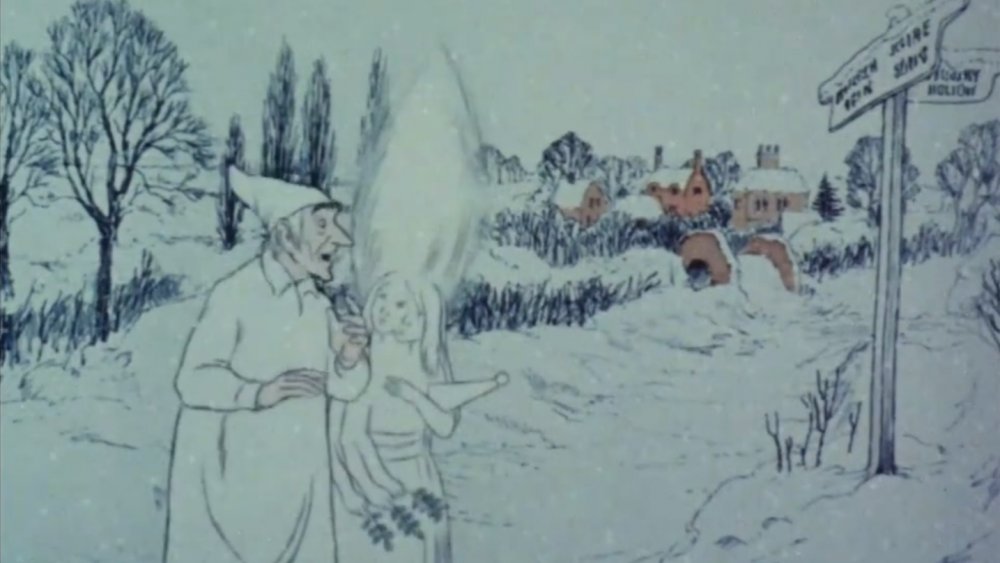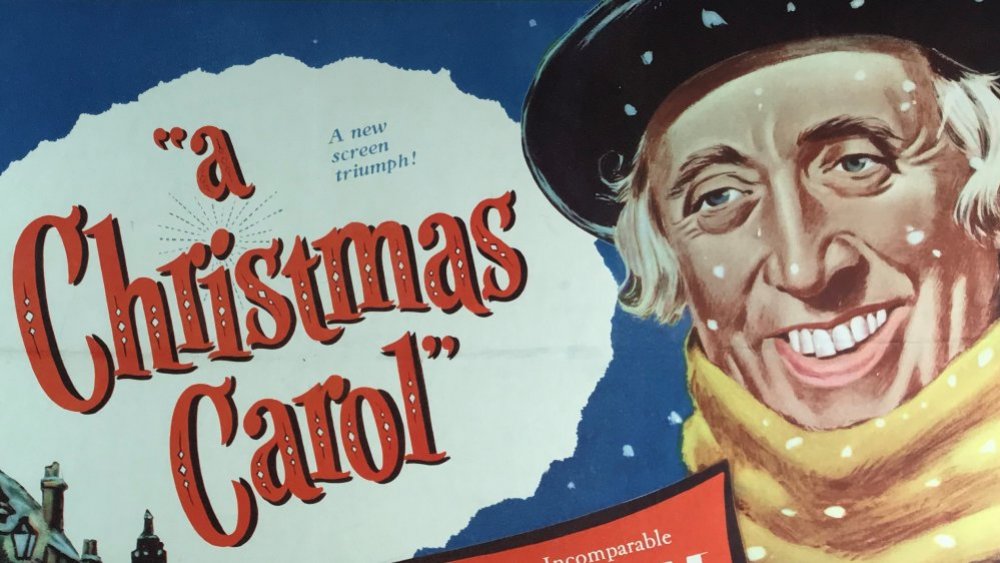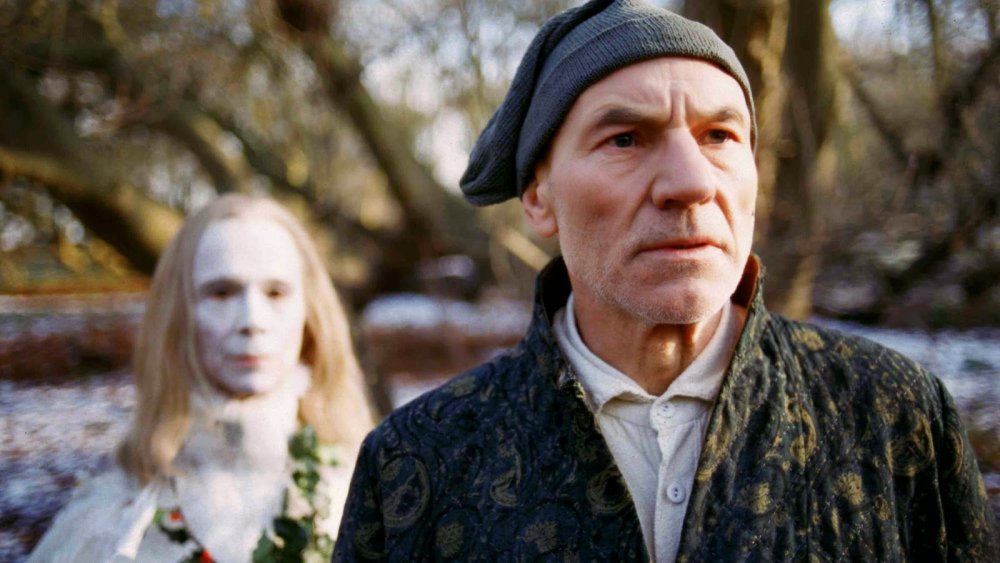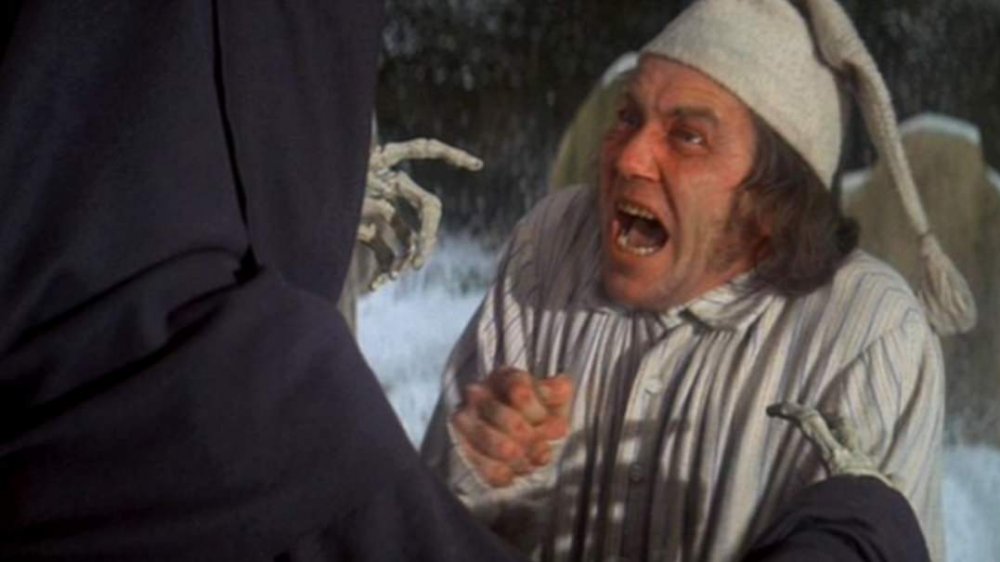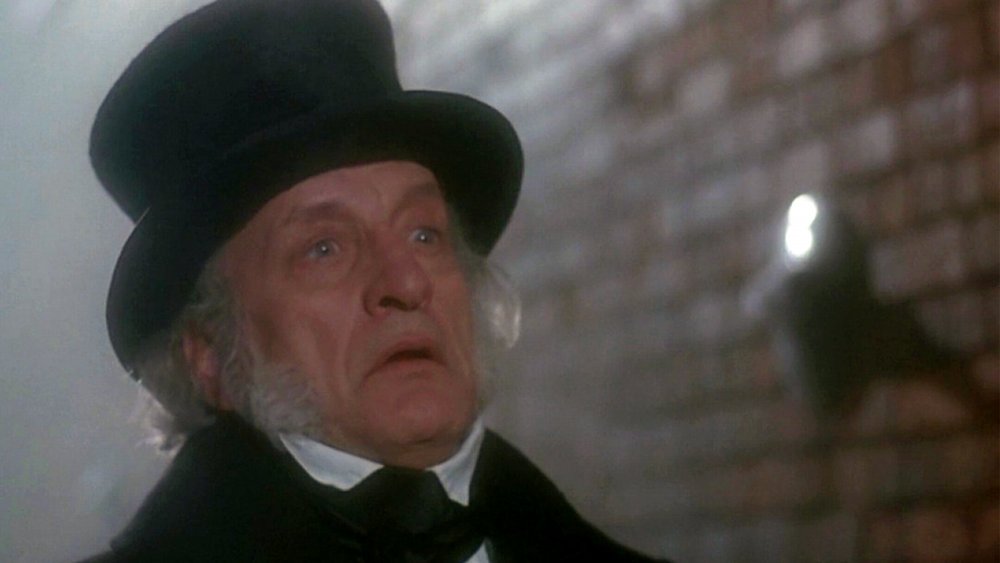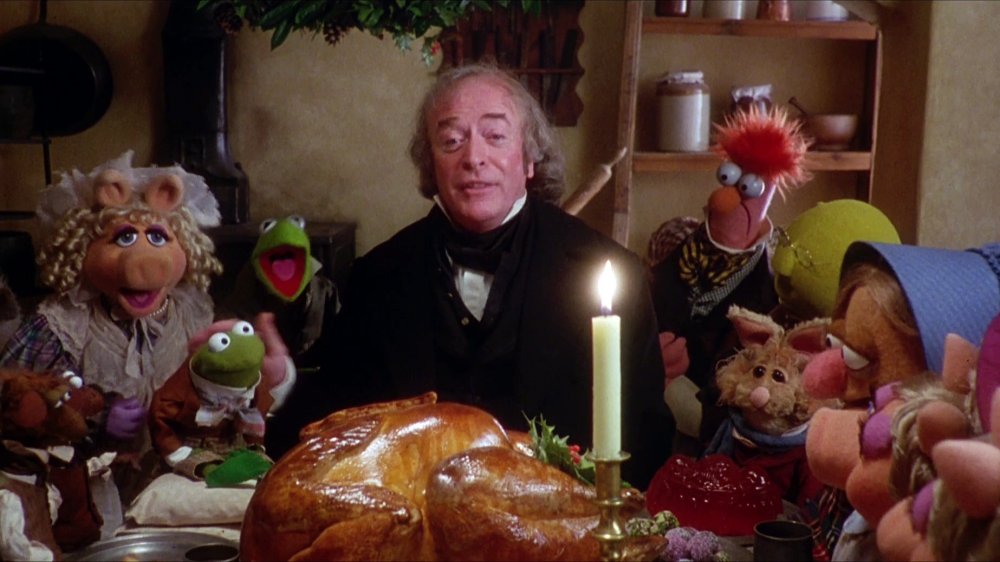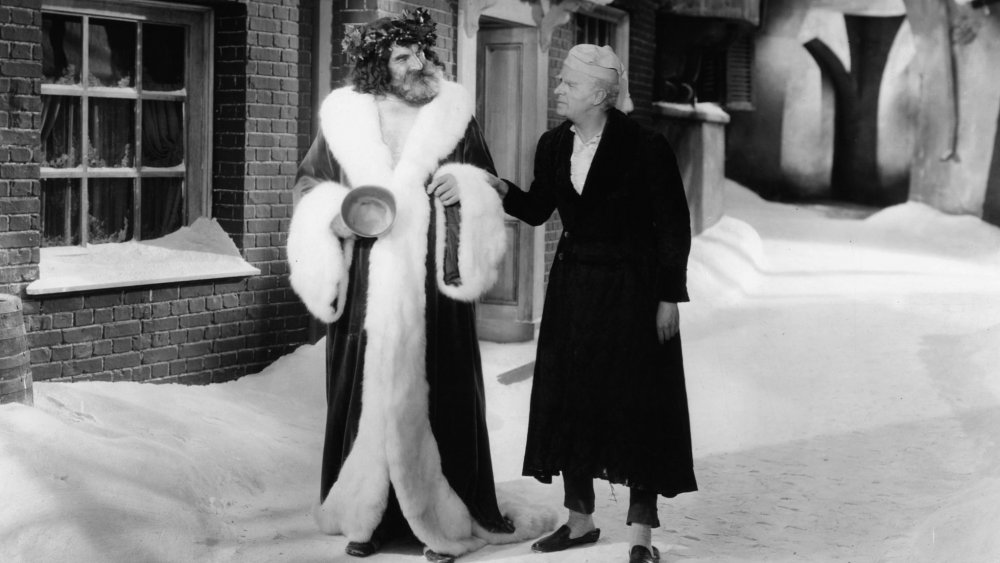A Christmas Carol Adaptations Ranked From Worst To Best
Your loved ones are near, there's a glittering tree, the yule log is burning — or perhaps you've got one streaming on your living room's TV — and the presents are waiting to be opened. What's missing from this picture? A beloved holiday tale, of course. Specifically, we're talking about Charles Dickens' A Christmas Carol, a story so adored that "Scrooge" has become a synonym for miser, "God bless us, every one!" is a well-worn aphorism, and countless jokes have been wrung from Scrooge's Christmas morning question, "What day is it?" Well, it's Christmas Day, of course, and the time is right for ghosts, feasts, and rewarding one's hard-working employees.
But like any cultural touchstone, A Christmas Carol adaptations range from the delightful to the derivative. Yes, some are the sort of story you gather with family to enjoy every year, but some are so bad you try to forget them, lest they stain any memories with traces of ill-conceived musical numbers and uncanny computer graphics. Just how do the many iterations of Dickens' classic tale of redemption stack up? From the total disasters to the heartfelt classics, here are A Christmas Carol adaptations ranked from worst to best.
Christmas Carol: The Movie
Have you ever thought to yourself that A Christmas Carol could use some slapstick animal hijinks to undercut all the Victorian gloom? How about a sleeker, younger Ebeneezer Scrooge who's given a second chance at love? Perhaps a warbly love song performed by Kate Winslet, heavy with hope that you'll see her name and the words "love song" and connect this thin movie to Titanic? No? Well, too bad, because 2001's Christmas Carol: The Movie is stuffing all that and more into 81 minutes of tooth-gritted cheer.
But it's not just the tacked-on frippery that makes this take on Dickens so skippable. The meat of the movie is about as stringy and tasteless as the Cratchits' average supper. Despite the A-list talent and the director's bonafides (at this point, he was best known for apocalyptic fable When the Wind Blows), Christmas Carol: The Movie is remarkably lifeless. The facial animation doesn't ever look quite right, as though every other frame is missing, and the acting is, at best, stiff. The entire operation feels dumbed down, attempting to appeal through gags, songs, and subplots no one of any age has ever needed in attempt to make audiences love the story at the movie's center. Therein lies the 2001 adaptation's fatal flaw. It doesn't trust Dickens, and it doesn't trust its audience.
A Carol Christmas
This 2003 TV movie attempts to liven up the classic tale by replacing Scrooge with a conceited talk show host and transplanting the story from Victorian London to modern-day Hollywood. It's an intriguing idea on its own. What setting, apart from A Christmas Carol's Victorian environs, better represents a story of greed, empathy, and false fronts than Tinseltown? And hey, isn't the idea of Scrooge as an image-obsessed celebrity haunted by the fame-hungry aunt who sent her on this destructive path pretty great? In concept, it's all strong and innovative.
Too bad about the execution. A Carol Christmas is that most grating of remakes — a fresh coat of paint that flakes away over the course of the movie's runtime, revealing the fact that it wasn't really all that necessary to begin with. The modern setting ends up making Dickens' story more cloying than anything else. Removed from sooty London, the sickly children and terrifying visions of the future feel more like after-school specials than grave warnings against avarice. Most damningly, A Carol Christmas is simply boring. By the final recitation of "God bless us, every one," the audience isn't so much watching the entire dreadful affair as it is waiting it out. The cranky celebrity might learn to be kinder by the movie's end, but the watcher has only learned to distrust highfalutin new takes on old favorites.
2009's A Christmas Carol
There was a sliver of time in the 2000s when movies fell in love with surreal, motion-capture-powered computer animation. Robert Zemeckis, fresh from using this technique in The Polar Express and Beowulf, decided to apply it to A Christmas Carol. Led by performances from Jim Carrey as Scrooge and Gary Oldman as Bob Cratchit, the results were ... odd. Some, like Roger Ebert, hailed it as "an exhilarating visual experience." Others, like The Telegraph, considered its distinct look distracting, enforcing distance between the characters and the audience that made it difficult to connect to the story's themes of cruelty and redemption.
Years later, the movie's reputation remains mixed, and it's not hard to see why. There are certainly strengths to be found within its uncannily animated depths. Carrey's Scrooge is a bit goofier than other renditions, but it fits the ghoulishly funny tone of the movie, and Oldman's Cratchit is pitch-perfect. But the visuals, so dazzling in 2009, look strange to modern eyes, and the tone of the whole affair sits uncomfortably between Carrey's jovial clowning and bleak Dickensian morals. It's a little too dark to be heartwarming and a bit too silly to be austere. There it sits, marooned, the redheaded step-child of both the animated Carols and the live-action ones. Only one thing is truly clear: It's nobody's go-to version when the holiday season rolls around.
2004's A Christmas Carol
You might not recognize Alan Menken by name, but there's a good chance you know his work. The legendary composer and songwriter is best known for his scores for Disney musicals. The Little Mermaid, Beauty and the Beast, and Tangled are all his work. So when he signed on to a brand new adaptation of A Christmas Carol starring Kelsey Grammer, itself adapted from a stage version of the classic story, hopes were high. The man behind "A Whole New World" and "Under the Sea" tackling one of the greatest holiday stories ever told? That's not just a good idea — it's about as safe a bet as anyone gets in the entertainment industry.
And yet somehow, this iteration of Scrooge's fateful transformation leaves something to be desired. The music is quite good, though it never hits the highs of Menken's greatest accomplishments. The story is solidly told, and the movie features a fine performance from Jane Krakowski as the Ghost of Christmas Past. Kelsey Grammer is as curmudgeonly as Scrooge should be, without ever crossing the line into irredeemability. And yet the entire affair is somehow inert. It never stops feeling like what it is — something adapted from the stage that probably should've stayed there. On film, it never offends, yet neither does it impress. It's trapped between worlds like Marley himself, unable to succeed in either one.
Mickey's Christmas Carol
Disney has been involved in multiple Christmas Carol adaptations, but this is the only that features the characters most central to the Disney Brand. Mickey, Minnie, and of course, Scrooge McDuck all star in this particular take on the tale. This brings a certain lightness to even the darkest parts of the iconic story. No one heads into a production of A Christmas Carol thinking Scrooge won't end up changing his ways, but there's still something soothing about the bleak first half of the story containing Mickey Mouse. For the youngest watchers, this is an ideal Carol indeed, with only the barest suggestions of real peril and intractable social ills.
Unfortunately, that's the only group this version is meant for. Anyone beyond the preschool years won't find much to love about this take, blunted as it is by Disney's core characters. This isn't to say it isn't sweet to watch beloved figures of childhood like Daisy Duck and Goofy traipse around London, learning the ways of goodwill towards man, but the sheer number of A Christmas Carol adaptations means that no viewer has to settle for mere sweetness. Leave this version in the nursery where it belongs, and move on to something better.
Scrooged
Unique among Carol adaptations, Scrooged actually features an in-universe staging of the classic Dickens tale. TV executive Frank Cross has ordered it so, and he doesn't care how much strain it puts on his overworked employees, nor that it means they'll have to sacrifice whatever Christmas plans they had. He is, of course, the Scrooge of this story, complete with dreadfully overworked assistant (here, a widow named Grace) and an old flame whose work in homeless services couldn't contrast more sharply against his uninhibited greed. Three ghosts visit him, lessons are learned, and in the end, Frank, who once gave everyone the cheapest possible branded towels as gifts, leads the Carol crew in a rendition of the 1969 classic "Put a Little Love in Your Heart."
Spins on Carol can go quite well, and this one does, for the most part. Modern mass media suits the protagonist, and it's different enough from the counting house of the original story to intrigue but similar enough to translate smoothly. Moreover, Bill Murray in the title role plays Cross with sharky, calculating menace. He's a Scrooge the audience fears on a visceral level, as he's so familiarly destructive. But there is a mean-spirited tone to the enterprise, as though the movie is embarrassed of seeming too earnest. This pairs oddly with the sentimental ending, which, in reuniting Cross and his love interest, actually goes further down the road to happy ending land than most Carols. All in all, it's fun ... but only just.
1971's A Christmas Carol
Released in 1971, this isn't the only animated rendition of A Christmas Carol on our list, but it might just be the most visually striking, a quality that netted the production an Oscar for Best Animated Short Film. Richard Williams, the animator who masterminded Who Framed Roger Rabbit and The Thief and the Cobbler, directed and produced this version in partnership Ken Harris (credited as "Master Animator"), and the pedigree is apparent in every frame. Unlike the outsized visuals of those two storied titles, however, A Christmas Carol is austere, almost dour, which is the result of the crew looking to 19th-century engravings for inspiration. As a result, this version might not be one children respond to, especially given the frequent use of strange pans, zooms, and deliberately odd scene transitions animators threw into the mix.
Moreover, it's a short piece, only 25 minutes long. Brevity might be the soul of wit, but one can't help but wish the film had a little more room to breathe, if only to explore the possibilities of its unique animation more fully. Still, the end result is a gorgeous half-hour of pure Dickens, as warm-hearted as it is deliberately rough around the edges. One forgets the happy ending when ensconced within the grimy first half of the tale, so it's all the more delightful to rediscover that in the second.
1951's A Christmas Carol (aka Scrooge)
Dickens' work isn't exactly what anyone would describe as "feel good." Sure, A Christmas Carol has a happy ending, but the reader needs to earn it. The splendid turkey dinner only arrives after pages of deprivation and penny-pinching. "Dickensian," after all, has become a descriptor unto itself, connoting poverty, filth, and straitened circumstances. You don't become what many consider to be the premier novelist of the Victorian era by describing happiness and cheer, but by turning a bright and unsparing light upon the realities of the era.
And this version of A Christmas Carol (aka Scrooge) is truly Dickensian. British giant of the stage and screen Alastair Sim dons the miser's stovepipe hat in this adaptation, cranking up the crotchetiness to the point that his Scrooge derides beggars, champions workhouses, and misses bidding a final farewell to dying Marley because his friend had the temerity to perish during business hours. It's a notably grim take on an already dark tale, but it works, for the most part, due to Sim's unbeatable screen presence. You hate Scrooge, but you never quite give up on him. That stirring central performance enlivens the whole production, making the film actively entertaining, instead of simply faithful to Dickens' dark tone. This is a deeply honest Christmas Carol, for better and worse, but it never loses its faith in humanity's ability to change.
1999's A Christmas Carol
A version of A Christmas Carol starring Patrick Stewart already has a leg up on the competition. Those who associate him with the poised charisma of roles like Jean-Luc Picard and Charles Xavier will automatically see him as a natural Scrooge, while those who are new to his work will be quickly convinced. His steeliness suits the character perfectly, while his comedy chops come into glorious play towards the end, when Scrooge wheezes and chokes his way into the first laugh he's had in years. Stewart is an actor at the height of his powers in this adaptation, as natural rolling his eyes at orphans as he is embracing Tiny Tim. He gives the entire production gravity, and he loans every scene and set piece weight and sophistication with his presence. One watches this take on A Christmas Carol and understands how Stewart's career has, if anything, only grown with age.
The movie around him, in contrast, is merely fine. There's nothing to complain about, really, but beyond Stewart's powerhouse performance, nothing catches the eye. As the central role is so capably filled, that's easily forgiven, but when placed beside other versions of the same story, it's a lot more noticeable. Stewart is talented enough to make the production notable, but in truth, he's the only thing that does. Happily for Dickens and Stewart fans alike, A Christmas Carol is very much Ebenezer Scrooge's story, and, thus, for 95 impeccably acted minutes, it's Patrick Stewart's story as well.
1970's Scrooge
"What the dickens have they done to Scrooge?" the tagline of the Scrooge poster pleads. That's right. This is a Christmas Carol movie that doesn't even bother to capitalize its punny use of the author's name. Moreover, it's a musical, and one made in 1970 at that. One hears these facts and imagines a sort of perfect, anti-Dickens storm approaching, all paisley, ballads, and West Side Story-style gutter dancing.
And yet, Scrooge actually ends up being pretty delightful. Yes, it enjoys thumbing its nose at staid ideas of the Victorian era and what a literary adaptation should be. But its heart is fixed firmly in the right place, and that results in a truly wonderful rendition of A Christmas Carol. The songs serve the story rather than smothering it, clarifying Dickens' essential themes as they spin them into an entirely new medium. Is this jauntier than the more classically Dickensian takes on the story? Yes. But that isn't simply a fact — it's a virtue. Scrooge might be making its own rules, but it never loses sight of its source material.
1984's A Christmas Carol
There's no shortage of Christmas Carol adaptations featuring top-class talent, especially in the role of Scrooge. But George C. Scott brings something inimitable to this version — a sheer power that emanates from every frame. His Scrooge is an aging lion, grown feral from injustice and avarice, and the actor's storied turns as Patton and Buck Turgidson are evident in every line reading. That's right. An actor from West Virginia brings something to a role as eminently British as Ebenezer Scrooge that the actual Brits could do well to learn from him.
This is a Scrooge who strides, and whose nastiness stings all the more for the force the man can put behind it. Thus, it's also a Scrooge who feels entirely transformed by the final credits, and accordingly, this is a Scrooge who delivers the moral with renewed vigor. He isn't just changed by his ordeal with the ghosts of Christmases past, present, and future, but he's rebuilt as a new man with new purpose. Alongside a cast that brings a certain worn-in quality many Carol adaptations lack — the Cratchits truly seem exhausted by their poverty here, instead of merely waylaid — Scott shines all the brighter, his performance enriching theirs and being enriched in turn. It's not just a great take on a classic story, nor a collection of impressive performances, but, in fact, a holiday treasure all its own.
The Muppet Christmas Carol
Who'd have thought that a rendition of A Christmas Carol starring puppets would be one of the best adaptations of all? Though, of course, these aren't just any puppets. They're the storied and beloved Muppets, and in fairness to their long and luminous history, they do tend to make pretty great movies. Unlike the worst offenders on this list, this film doesn't just trot out the morals everyone expects, nor does it put an unnecessarily new spin on things that don't need changing. Rather, it internalizes the best things about the story while providing a new lens with which to view them and, thus, love them like we did the very first time we heard the story.
To start with, there's Michael Caine's Scrooge. He's as grouchy as he should be, but in surrounding him with puppets, a comical edge is teased out of the man. He's a terror, but you're laughing at him from the beginning. This makes the movie an ideal choice for the youngest viewers, but it also gives the film an inventive spin on Dickens' tale altogether. While some on this list succeed by leaning into the story's darker elements, Muppets succeeds by embracing the author's incredible sense of humor, joy, and goodwill. Plus, you get to see Gonzo, best known for his weird blue nose and love of chickens, play cultural cornerstone Charles Dickens. What's not to love?
1938's A Christmas Carol
What makes A Christmas Carol great? There's the satisfaction of seeing a villain confronted with the consequences of his actions. There's the sly sense of humor that peeks out from around the story's most cynical corners. Plus, there's the community spirit that it celebrates and facilitates. But beyond all of that, there's the hope it kindles. A Christmas Carol tells us that it's never too late to be a bigger, better, more benevolent person.
It's this spirit that the 1938 adaptation embodies. From its first scenes — children fleeing in fright of Scrooge's nephew, tainted by association — to its sublime ending, it's a beacon of progress in all its forms. Reginald Owens' Scrooge is a rangy old monster who finds himself falling in love with life again, flush with the fact that it isn't too late for him (or anyone, for that matter). That this film was made in the midst of the Great Depression for a weary public remains clear in its balance of optimism and futility. This is a movie for those all too familiar with Scrooge and his ilk, as Dickens' audience was in its day. This version of A Christmas Carol understands the power of its story like few others, and going on a century since its debut, it still shines like it did the day of its premiere.
